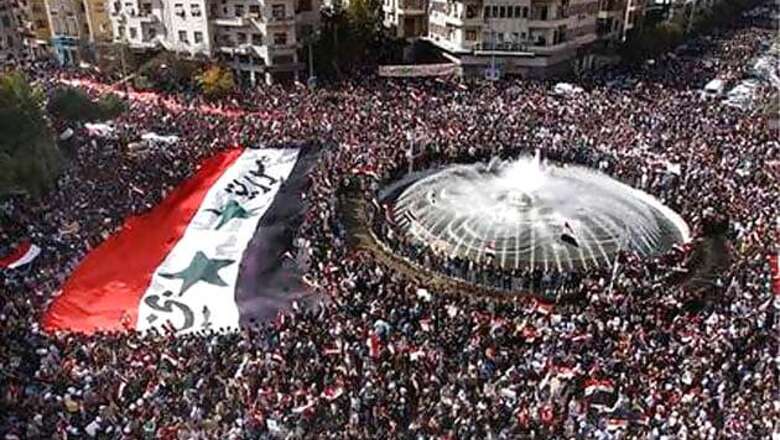
views
New Delhi: After Iraq, Afghanistan and Libya, the West's war eyes are now firmly fixed on Iran and Syria. International reportage on the Syrian crisis has drastically changed its character over the last fortnight or so. The entire discourse on the urgency to "stop the brewing humanitarian crisis' has changed tracks. The new discourse as outlined by the West and its lackeys in West Asia and North Africa now is that the "Bashar al-Assad regime must go."
As the recent conference in Tunis of the "Friends of Syria" will suggest, (never mind that the Syrian government was not invited), the West will, in all likelihood, sing the "freedom and democracy" tune. It's a tried and tested adage and has worked well for them in the short run. It helps the Western powers to rally moral support at home for another bloody campaign. The knights in their shining armour come flying and put an end to all things bad and oppressive, albeit with the bravery of being out of range.
Reports are already surfacing how the Free Syrian Army rebels are getting supplies of sophisticated arms and ammunition. In all probability, the West would choose the Libyan model: neutralise Assad's capital firepower from the air and let the Free Syrian Army boots do the job on the ground.
But regime change in Syria is a means to an end and not an end in itself. That end is Iran. Iran's staunchest ally in the region is Syria and its Alawite Shia leader Assad. Toppling the regime and replacing it with an elected Sunni-majority government will put Syria in the docile group of Iran-hating West Asian states.
It will weaken Iran considerably which will obviously lose its leverage in Syria and Lebanon. That way, the West's strategy seems to completely isolate Iran and force Tehran into a corner so that it has to give up its nuclear programme.
What is interesting is that in the name of bringing democracy to West Asia, the West's targets are invariably socialist and secular dictatorships and never the oil-producing Saudi Arabia or other princely emirates which suck up to the West. The Arab Socialist Baath Party, headed by Assad (Yes, Saddam headed the same in Iraq), has always maintained the separation of state and religion. Saddam ran a similar system in Iraq which is today the breeding ground of violent Salafist-Wahabi groups. Libya has walked the same path and Syria with a 74 per cent Sunni population should not fundamentally deviate from this trajectory too.
So, the first and the most-important-in-the-long-run effect of the Syrian campaign would be replacement of a socialist, secular system by an elected and intolerant religious regime.
Second, the human cost of the Syrian adventure will be many times more than what has happened in Libya. Syria has one of the most extensive air defence systems in the region and degrading the same will take more than a few weeks. Assad's armed forces are considerably larger too and number in hundreds of thousands. The duration of such a conflict will be markedly longer. In case Iran intervenes with help to the Syrian government, it could become a protracted civil war with the West and its Arab allies supplying the Free Syrian Army.
Third, If Iran sends help to the Assad regime, the theatre of aerial war could extend even into Iran. Full-scale armed invasion of Iran is not possible, given Iran's size, its largely homogeneous society and functioning democracy. But air strikes could be carried out to damage oil installations and to cut supply lines to Syria.
Fourth, Iran could retaliate against air strikes by targeting the West's military bases in the region and of course, Israel. With proven ballistic missile capability, the numbers of which according to DEBKAfile runs into thousands, Tehran could also create enough trouble in the Persian Gulf to disrupt the sailing of oil supertankers. That would send oil prices shooting through the roof. The worldwide inflation figures which have shown signs of tempering down would then again jump into double digits.
In case of Western air strikes on Syria, Israel could emerge as Damascus' whipping boy. Syria possesses ballistic missiles and advanced supersonic cruise missiles like Yakhont (similar to Brahmos) which can target installations and population centres in Israel.
The West would be wary of any possible Israeli retaliation against Syria or Iran as that would turn public opinion across the Arab world against their governments and their Western allies. This can completely derail the entire American game plan in West Asia. Washington does not want its West Asian allies to go the Egyptian way. So it needs to be seen if the Americans can rein in the Israeli government like they could during the Iraq War.
The role of Russia and China in this entire equation would be interesting to say the least. Both have shown their intent in vetoing the UN resolution against Syria. Syria's and, to a large extent, West Asia's fate will depend on whether Moscow and Beijing translate their opposition to the Syria plan into concrete action on the ground. While one does not foresee an armed confrontation between the major military powers of the world, pre-emptive intervention by stationing small columns of troops or using their influence on Assad to give some concessions may act as measures of deterrence against armed intervention by the West.




















Comments
0 comment